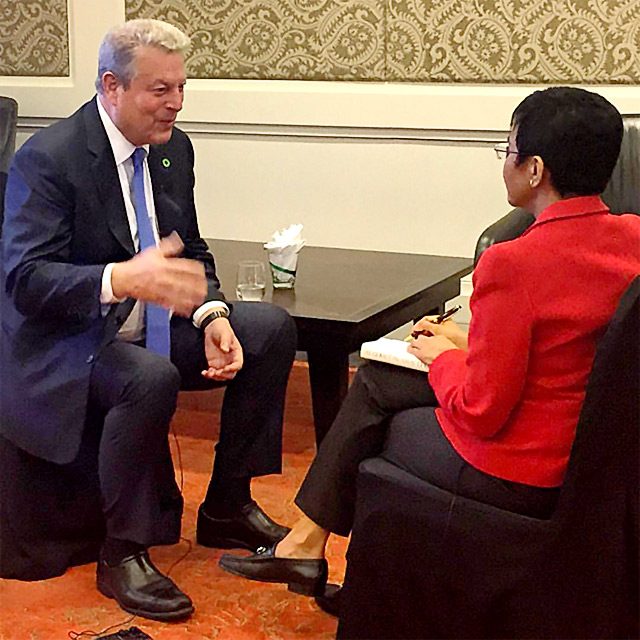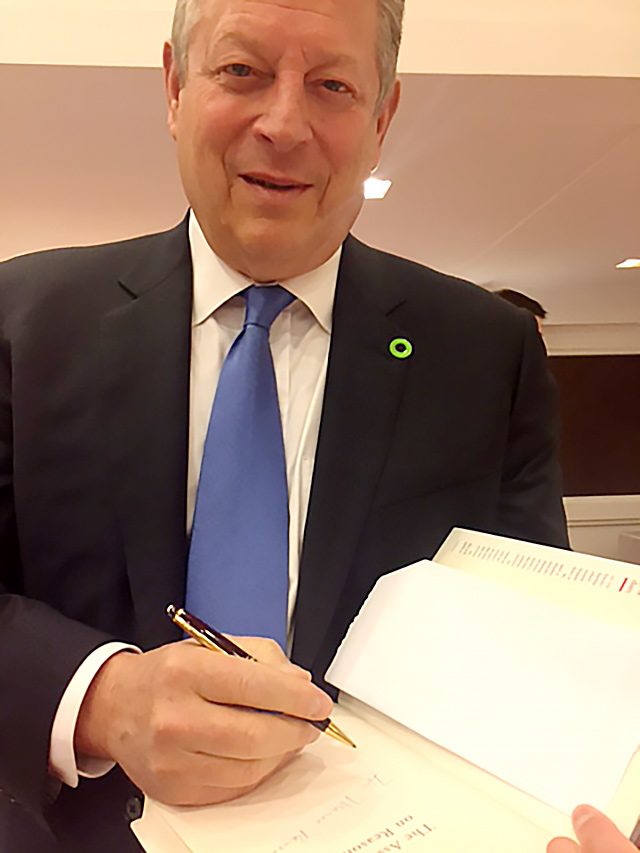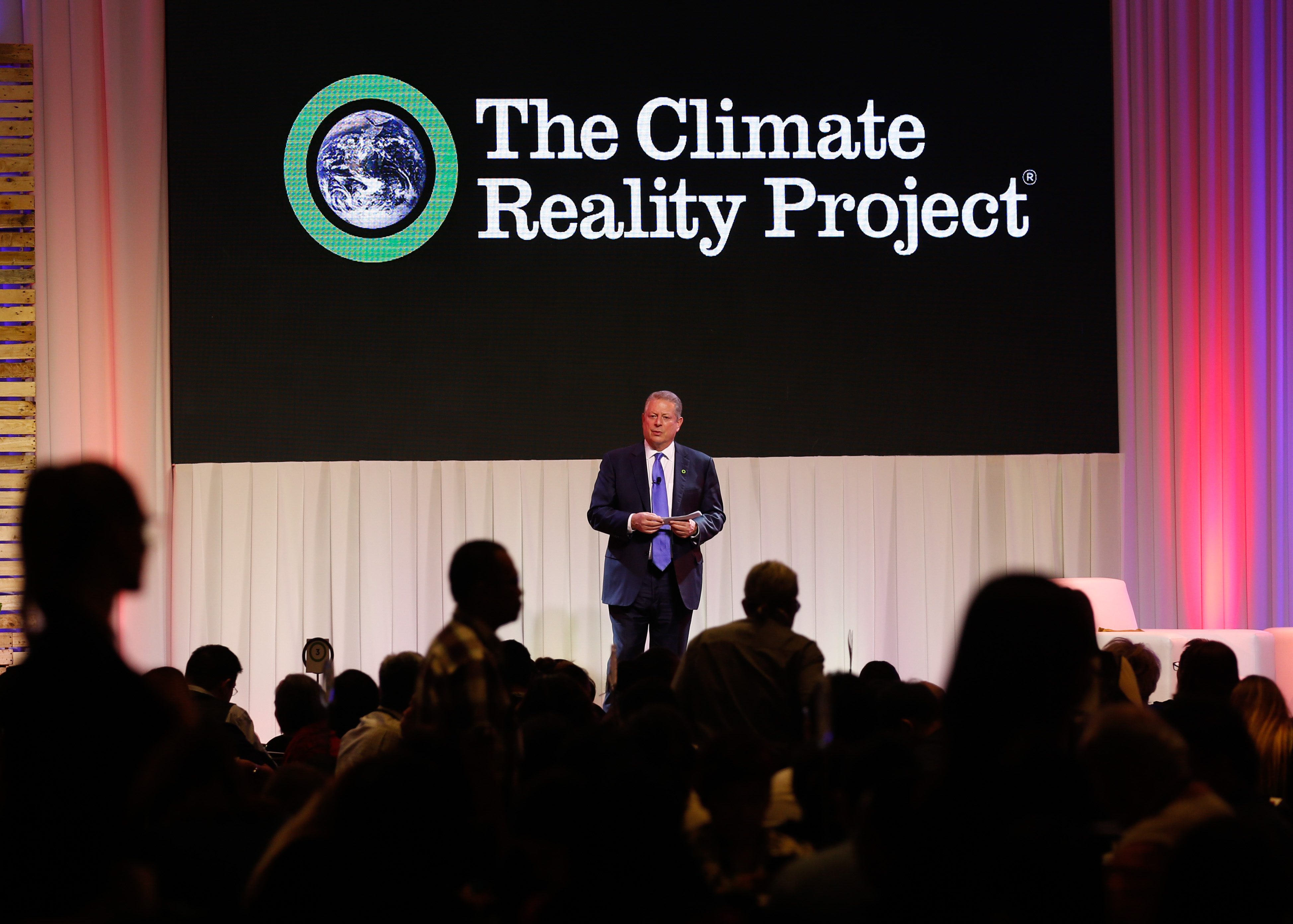SUMMARY
This is AI generated summarization, which may have errors. For context, always refer to the full article.

Technology is driving this time of creative destruction, and it impacts all aspects of human endeavor.
“We are now living in a most unusual period in all of human history,” environmentalist and former US Vice President Al Gore told Rappler in an interview on the sidelines of the 31st leadership training in Manila by The Climate Reality Project, a non-profit organization Gore set up in 2006.
“We are undergoing multiple technological revolutions simultaneously,” said Gore. Then in about two and a half minutes, he summarized his nearly 600 page book published in 2013, The Future: Six Global Drivers of Change.
Our conversation had a strict 20-minute time limit. We wove through the climate, the Paris agreement and coal; how technology could bring down the costs of renewable energy and how it’s sparking multiple revolutions impacting politics, governance, and society.
“Our democracy’s been hacked,” he told me. “The operating system no longer works for its owners, and we need to take it back.”
A senior advisor to Google, Gore sits on the board of Apple (and declined to comment on the latest privacy issue hounding that company). A former journalist, he was one of the Internet’s main advocates when he entered politics, helping pass bills and policies that helped create the worldwide web we know today.
Gore was elected to the US House of Representatives in 1976, the US Senate in 1984 and 1990, inaugurated as the 45th vice president of the United States in 1993 and served two terms. In 2000, he won the popular vote but lost the presidential election to George W. Bush.
In the decade after, he became a best-selling author with books like Earth in the Balance, The Assault on Reason and An Inconvenient Truth, which was turned into an Oscar-winning documentary; won the Nobel Peace Prize in 2007 for his environmental activism; and created and sold his stake in Current TV, an independently owned cable and satellite television network focused on user-generated content and citizen journalism.
He has consistently been one of the harbingers of crisis – in the climate, in politics, in society – but as I learned first-hand, he couples that with an optimism that finds its solution in technology and the youth. (WATCH: Breakout session: Digital communications as tools for climate action)
“I’m optimistic that in this new internet, digital, social media era, we are seeing the rise of popular grassroots movements in every country,” said Gore. “That really brings me a sense of hope and optimism.”
“But you know that grassroots movement online can turn into a mob like that,” I countered, snapping my fingers.
He paused a second.
“That is a risk that the advocates of democracy have always been willing to run because in the long run, the benefits of harvesting the wisdom of crowds, trusting in what we know to be the truth – that all of us together are smarter and wiser and more effective than the smartest individuals among us,” he said.
“If we can create the social and political conditions that bring out the strengths in democracy while avoiding the dangers of mob-o-cracy then that is our best and only viable pathway to the future.”
I pointed to public anger simmering just beneath the surface in the United States and the Philippines, both facing elections this year. That has fuelled a clamor for change and the candidacies of Rody Duterte and Grace Poe in the Philippines and Donald Trump in the US.
“Some of the statements that in the past would have knocked him out of the race actually did not,” replied Gore about Trump. “I think you’re right in the assumption that this reveals a depth of anger and frustration – and even humiliation – on the part of a great many who feel that their concerns have not been listened to.”
“I think that during this period when elites and wealthy interests gained so much power over the political and policy decisions that were being made, the great mass of people were – to some degree – left behind. And when economic growth as measured by GDP went up 3%, median income went down 3%, and those in the elites at the top were saying, ‘oh this is great.’ But so many tens of millions of people said, ‘well, it doesn’t feel great to us.”
“I think that it’s a wake-up call.”
Here are excerpts from our conversation, which revolved around 3 themes:
1. Climate Change and politics
A geek with an eye for numbers combined with the politician’s ability to simplify won Gore a Nobel and an Oscar for his work on greenhouse gas emissions and climate change.
During his lecture in Manila, Monday, March 14, he pointed out that the Philippines is the country that experiences the most weather-related disasters in the world, followed by Bangladesh and Vietnam.
Two days earlier, he visited ground zero for super typhoon Haiyan, known here as Yolanda, saying for two years he had tried to describe what he had never seen. (READ: Al Gore visits Yolanda ‘ground zero’)
“One of the secrets of the human condition is that suffering binds us together,” he said. “When I was there, it really hit me very hard, talking to the survivors and hearing some of the heart-wrenching stories. My gosh, what suffering … I was very deeply impressed by the strong spirit, the resilience, the commitment to rebuild and to renew lives.”
He thanked the Philippines for leading the effort to push for a lower 1.5 degree cap against global warming at COP21 in Paris last year and urged world leaders to sign the Paris climate agreement in New York on April 22. (READ AND WATCH: Al Gore to Filipinos: Yolanda taught world about climate crisis)
Once signed, the agreement takes effect in 2020, but it requires at least 55 countries representing at least 55% of global emissions to ratify it first.
Nearly 200 nations signed the deal in Paris, but we spoke about how there’s often a gap between words and reality.
“The developing nations came through at the Climate Vulnerable Forum,” I started. “The pledges were there. What about the developing nations? Who will pay for this?”
“Part of the basic global compact involves an obligation on the part of the wealthier countries to provide assistance to the less-developed and poorer nations to make the transition that we all have to make,” he answered.
He talked about how technology is bringing costs lower, paving the way for opportunities.
“One of the reasons for the success at Paris is that people, both in the developing nations and the industrial nations, began to realize that the sharp reductions in cost for electricity, wind electricity, now batteries and most of all efficiency – all these cost reductions, unexpected in the speed with which they’ve taken place, is making it easier for every nation to make this transition. And a lot of the money that developing nations will use to navigate this transition is going to be provided by investors who see the opportunity.”
“It’s the biggest opportunity in the history of business,” he emphasized.
“The second factor that will contribute to our victory here is that publics around the world are becoming ever more aware of the reality of the climate crisis. Also becoming aware of the opportunity to create jobs, and transforming buildings, installing renewable energy, retrofitting industrial and business systems to be more efficient. This is really the most promising source of new employment in an era when we’re seeing a decline in the wages of middle-income jobs across the board.”
“Both countries – the Philippines and the United States – the rhetoric doesn’t match reality in many instances,” I stated, bringing our discussion to politics. Often words don’t match action.
Like when the Philippines pledged to cut its carbon emissions by 70% by 2030 in Paris last year, actions at home did the exact opposite when the government approved 23 new coal plants.
Coal emits more greenhouse gases than any other fossil fuel, and scientists agree that burning coal will undermine efforts to limit the rise in temperatures.
Climate advocates tell Rappler coal generates about 42% of the Philippines’ presently energy supply, but recent government approvals now threaten to increase that to 70% coal in a decade, the opposite of its COP21 pledge.
“Yeah, it is an irony,” said Gore, “but I would draw comparison to between this period of time in the Philippines and the last decade in the United States. We had proposals on the drawing tables for hundreds of new coal-fired generating plants, and virtually all of them ended up being cancelled for a variety of reasons that you can also see beginning to play out here in the Philippines.”
Gore pointed to greater education about climate change: communities where they’re set to be built are rising against it. In addition to that, he said there will be “pure economic forces that are unleashed when it becomes cheaper to get electricity from solar panels and windmills.”
“I think it’s going to make it more likely that the Philippines will replicate some of the experiments we had in the United States in thinking twice about the proposals for these coal plants,” he added, pointing out that costs increase because coal is imported while once built, solar farms have no additional costs.
“So we’re in the midst of a revolution. We’re right at the cusp of a new historic era.” (READ: Coal-minded leaders left behind by green energy growth – Al Gore)
2. Technology and society
Gore has a clear understanding of the impact of technology on society. He outlined 6 key drivers of change in his latest book:
- Work: how outsourcing is moving jobs from West to East and the move towards automation (or robosourcing) creating a new global economy; “We’re seeing the interconnection of the global economy to the degree we’ve never experienced before,” he said.
- Power: shifts from West to East, from national governments to businesses and corporations as well as rogue players like guerrilla and terror groups;
“There’s way too much influence wielded by those with large amounts of money,” he said.
“We need to restore healthy democratic processes.”

- The Internet and the Global Mind: the communication revolution – instant connections and the deluge of information;
“We’re seeing also the connection of the internet of things with billions of devices and intelligent systems connecting to one another around the world, creating a completely new technological reality for us,” he told me.
- Biotechnology: the impact of exponential breakthroughs in the medical sciences and genetic research;
“We’re seeing the cost of gene sequencing come down at a rate six times faster than the Moore’s Law pattern that brings computer chips down in cost by half every two years. We will soon have the ability to sequence each individual’s DNA for $100 and not long after that for $10. That will revolutionise medicine.”
“I could go on,” he continued. “The new materials in the sciences. We now have the ability to create brand new materials. We read back in history about the bronze age and the iron age. Now we’re in a new age where we’re making the new materials that are stronger and lighter.”
- Demographics and the depletion of natural resources: unsustainable population growth stressing ecosystems;
“During the last century alone, we quadrupled the human population. By way of perspective, it took 200,000 years for our species to reach the one billion mark, yet we have added that many people in just the first thirteen years of this century.”
- Climate Change: how humanity must work together to bring down greenhouse gas emissions.
For Gore, understanding these 6 drivers of change and how they interact with each other can bring new ways of understanding each problem they bring.
“Taking all of them together, it really poses a challenge to our moral imagination, to our ability to stay ahead of it, and to avoid some of the pitfalls while harvesting the magnificent gains that are now possible,” he said.

3. Media and power
“How is this technology impacting our politics,” I asked him.
“I think that the ability to govern ourselves has always been connected to the way in which we communicate with one another,” he replied.
He broke down “three great waves of communications technologies” starting with the printing press and how it empowered individuals to communicate powerful ideas with the written word.
“That actually empowered the rise of representative democracy,” he told me.
The second wave came with television, when the public marketplace of ideas became controlled by the gatekeepers, “who control access to the television channels and corporations and wealthy special interests began to monopolise the distribution of political ideas.”
According to Gore, this eroded American democracy.
“Politicians found they had to start spending more time begging wealthy interests for the money and campaign contributions necessary for them to gain access to the television medium.”
fThe third wave is the Internet and social media.
“I’m optimistic that the structure of this new information ecosystem is once again empowering individuals to use ideas and knowledge and the best available evidence in order to substitute knowledge for force of arms and political power and wealth.”
“We’re not there yet,” he said. “We’re right in the middle of this transition. We have one foot in the television mass media age, and the other foot is stepping into the Internet age. I’m optimistic the digital technologies are going to empower a revival of representative democracy.” – Rappler.com
Add a comment
How does this make you feel?





There are no comments yet. Add your comment to start the conversation.